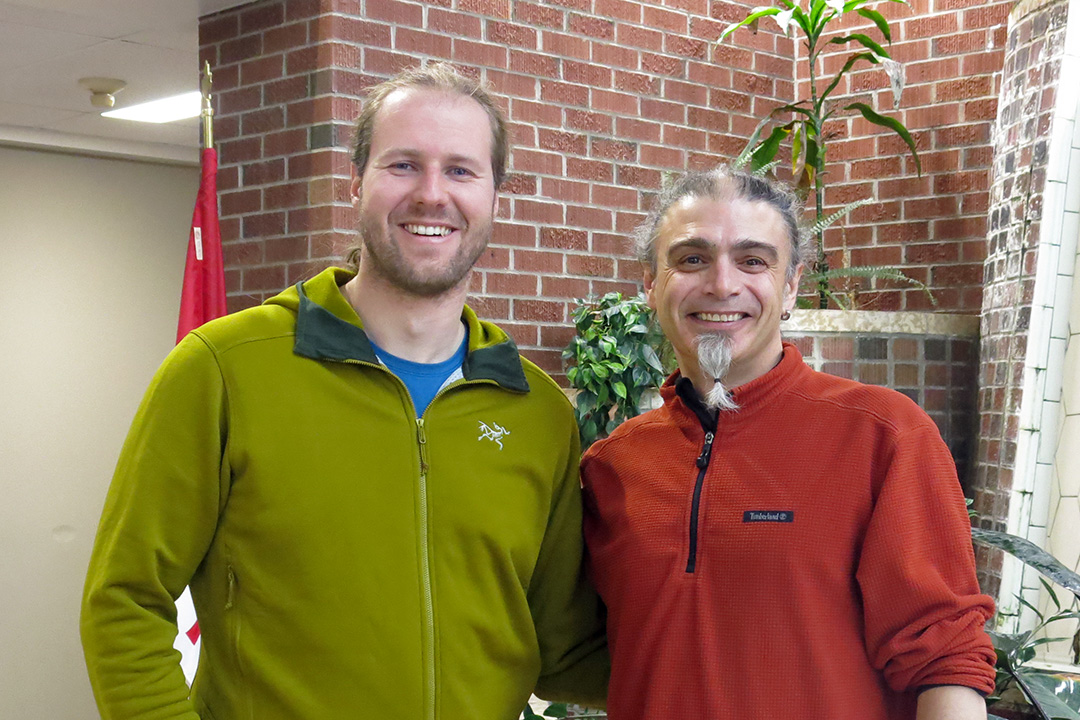Saskatoon, Saskatchewan, Canada
February 12, 2019

From left: Martin Mau and Timothy Sharbel.
Martin Mau, senior researcher at the Global Institute for Food Security (GIFS) at the University of Saskatchewan (USask), has been awarded funding from a Saskatchewan agricultural fund to enhance a research project that could speed up plant breeding in Saskatchewan and around the world.
Mau, a post-doctoral fellow, has received almost $625,000 from Saskatchewan’s Agriculture Development Fund (ADF), which includes $62,400 from the Saskatchewan Canola Development Commission for a four-year project, the goal of which is to preserve hybrid vigour in Brassica crops, such as canola.
The strategy uses apomixis, a naturally occurring form of plant reproduction in which a flowering plant produces seeds without sexual crossing with another plant.
“Apomixis is currently largely absent in food crops, and has tremendous potential in plant breeding,” said Mau.
“For farmers, bringing apomictic reproduction into elite hybrid crop plants would result in identical favourable traits in future offspring, reducing the cost of seed production. For breeders, apomictic crops could enable the cost-efficient transfer of favourable traits from wild relatives into their elite inbred lines for world-wide use on locally adapted crops in niche breeding projects.”
The study of the genetic principles of apomixis is very time consuming. For the past four years, supported in part by funding through Timothy Sharbel’s Research Chair in Seed Biology at GIFS, Mau and his team have been working to successfully demonstrate the transfer of apomixis into a sexual Boechera plant—a scientific model organism of the economically important mustard family.
With this ADF funding, Mau and his team will have sufficient time to mature their breeding approach in canola. They will use the successful apomixis donor lines from their pilot study in a crossing strategy to generate apomictic hybrid Brassica seed material. They will also conduct crossing with the pilot study plants, combined with state of the art sequencing technology to identify all of the genetic factors that contribute to apomictic reproduction. This approach will provide them with the information they need to potentially introduce apomixis in other crops.
“This award is an excellent example of how progress arising from GIFS’ early stage investment in potentially game-changing research can lead to further development linked to mainstream crops,” said Stephen Visscher, GIFS interim executive director and CEO.
“It illustrates how the young and emerging talented scientists we have here at GIFS are harnessing their GIFS-based research to attract new funding to begin to advance exciting new research that could have tremendous benefits for agriculture.”
Mau was born on the Baltic coast in northeast Germany and studied biology at the University of Wuerzburg in Bavaria, Germany with an emphasis on the biophysics of pore-forming proteins in both bacteria and plants. He became interested in apomixis during his PhD in Sharbel’s Apomixis Research Group at the IPK Gatersleben, in collaboration with the University of Heidelberg, and came from there to GIFS. His use of geographical data in Global Information System (GIS)-based models of ecological niche distribution of sexual and apomictic Boechera plants has led to novel insights into their evolutionary history.
To learn more about GIFS and Mau’s research, visit gifs.ca.
A total of 54 USask research projects have recently been awarded a total of $15.7 million by the provincial Agriculture Development Fund. The funding includes more than $3 million in contributions from industry.
About GIFS: The Global Institute for Food Security (GIFS) at the University of Saskatchewan was founded in 2012 through a partnership of Nutrien (then PotashCorp), the Government of Saskatchewan, and the University of Saskatchewan. GIFS’ mission is to help feed the world through transformative innovations in agriculture and food production that will benefit Saskatchewan’s economic, social and environmental well being and which will empower developing countries to achieve local food security.